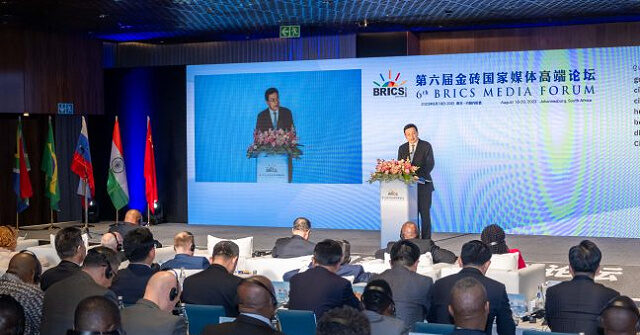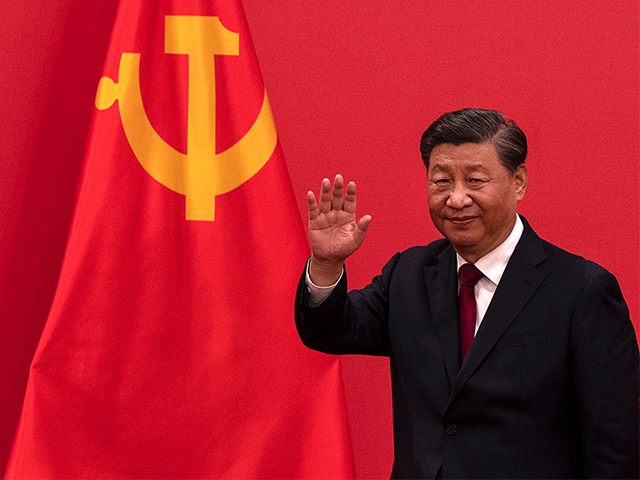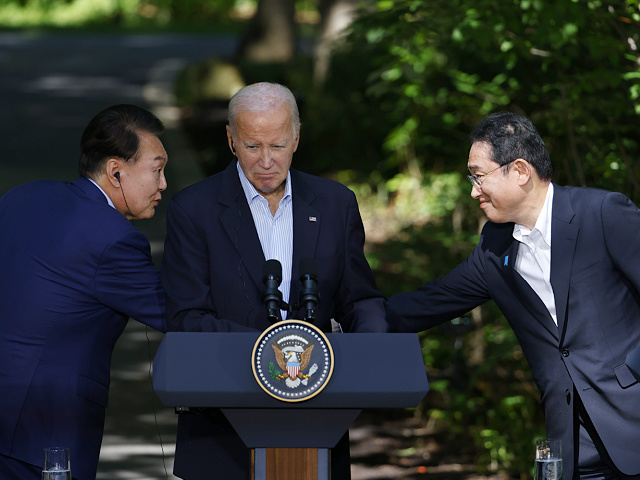
The 2023 BRICS top is scheduled for Tuesday through Thursday today, bringing together the five member countries of Brazil, Russia, India, China, and South Africa to lay the groundwork for a world of post-American “inclusive multilateralism.”
Evaluating by the protection in Chinese state media, that world looks like a China-dominated rejection of Western security and humanitarian issues.
Chinese dictator Xi Jinping composed an op-ed for South African media on Monday as he left for Johannesburg to attend the top. Xi’s letter advised South Africa of China’s support– including, most recently, products to fight the international pandemic China unleashed– and applauded South Africa for being the very first country on the continent to sign up with China’s Belt and Roadway Effort (BRI).
“Numerous Chinese companies are expanding their operation and at the very same time taking more social obligations in South Africa. Cars and house devices with Chinese brands yet made in South Africa are incredibly popular among regional consumers, and are now owned by various South African homes,” Xi composed.
“South African business are likewise racing to buy the Chinese market to take the plentiful service opportunities, and they have made crucial contributions to China’s economic development,” he added.
Xi claimed China– which is currently menacing every other nation bordering the South China Sea in an act of naked territorial aggression and tacitly supports its partner Russia’s savage intrusion of Ukraine– is somehow the heart and soul of peace worldwide, and South Africa is on the exact same cultural wavelength:
China and South Africa should be champs of our common interests. What the world requires today is peace, not dispute; what the world desires is coordination, not conflict. China and South Africa, as natural members of the Global South, must all the more collaborate to appeal for greater voice and impact of developing countries in global affairs, promote sped up reform of worldwide financial institutions, and oppose unilateral sanctions and the “small lawn, high fence” technique. We ought to collectively secure our common interests.
Xi Jinping on October 23, 2022, in Beijing, China.(Image
by Kevin Frayer/Getty Images) Xi promoted a”China-Africa Leaders’ Dialogue” that would mimic, and straight counter, President Joe Biden’s sputtering outreach to Africa. Biden’s technique looks significantly like a half-hearted effort at checkbook diplomacy, while Xi assured to give African leaders front-row seats to the brand-new Beijing-dominated world order he imagines:
I will deal with African leaders to bring more active, effective and sustainable development initiatives to Africa, broaden cooperation in agriculture, manufacturing, brand-new energy and digital economy, and facilitate Africa’s economic combination, industrialization and agricultural modernization. China will continue to work for substantive progress in African Union’s signing up with of the G20 this year, and anticipates a greater role by African countries and the AU in worldwide and local affairs.
Chinese state media on Monday boasted of the growing number of establishing nations demanding membership in BRICS– a group of about 40 nations whose newest member, Algeria, joined in July. A few heavy-hitting economies have actually expressed interest in signing up with also, including Saudi Arabia and the United Arab Emirates, a Middle Eastern collaboration that has been growing more far-off from the United States because Biden took workplace.
China’s state Xinhua news service gushed that BRICS has ended up being “a favorable, steady, and constructive force in worldwide affairs” that uses options to Western institutions like the International Monetary Fund (IMF):
Above all, BRICS defends multipolarity and multilateralism, Cuban President Miguel Diaz-Canel stated. By doing so, “BRICS nations are countering the principle of the Cold War and opening up the possibility of a more fair and just worldwide order that benefits the world.”
“In a progressively polarized world, BRICS is creating a making it possible for opportunity for nations to style a more inclusive political and economic order,” said Cavince Adhere, a Kenyan worldwide relations scholar.
Lots of nations are tired of the United States’ virtual domination of the worldwide economy for decades, the Spanish site Rebelion stated. Failure to abide by Washington’s instructions results in sanctions and monetary blackmail.
Xinhua hoped BRICS may present its own currency, a relocation that would advance Beijing’s long-held dream of dismissing the American dollar as an essential instrument of global trade. A greatly broadened BRICS alliance including most of the developing countries of the “Global South” would also neutralize what remains of the West’s ability to apply impact through economic sanctions.
“The very first definitive step could be the development of BRICS’ shared currency, which would liberate a considerable part of the world from U.S. dollar domination,” Cameroon News Agency Director-General Xavier Messe A Tiati told Russia’s state-run Tass news company on Monday.
“The U.S. is utilizing its position to suffocate those countries that do not accept its ideology by introducing sanctions against them. As an outcome, sovereign states sometimes can not utilize their dollar bank properties when they want to,” Tiati discussed.
Composing at Oilprice.com, Michael Kern saw BRICS becoming “a formidable geopolitical entity that can counterbalance Western hegemony.”
The last gasp of that hegemony might have been pressing Russian President Vladimir Putin into delivering a video address rather of going to the top since South Africa would have been required to detain him for war crimes in Ukraine under the International Bad Guy Court (ICC) treaty.
Russian President Vladimir Putin in Saint Petersburg on June 30, 2022.(Image by MIKHAIL METZEL/Sputnik/AFP by means of Getty Images)
“Spread throughout continents with distinct financial models, a mutual suspicion binds these nations. They question a world order relatively skewed towards the interests of the U.S. and its allies. An order they think sets international norms that the West anticipates others to follow, without constantly sticking to them themselves,” Kern kept in mind.
The BRICS nations would also prefer to let the fading West bear the burden of fighting “climate change.” Officials from BRICS nations like to discuss environment modification, but they see it as an expense the United States and Europe should cover. China– the world’s worst polluter by a very wide margin and one of the world’s biggest economies, but totally immune to pressure from the climate change movement– encourages that belief.
Russia plainly sees an expanded BRICS as a way to surpass Western sanctions and reverse its status as an international pariah after attacking Ukraine.
“Through joint efforts, BRICS has actually handled to produce a culture of discussion based upon the concepts of equality, regard for the choice of one’s own developmental path and factor to consider of each other’s interests. This assists us discover commonalities on and services even to the most complicated problems,” Russian Foreign Minister Sergei Lavrov informed South Africa’s Ubuntu magazine on Monday.
Lavrov gushed over the combined wealth and influence of the BRICS core subscription: they have more than 40 percent of the world’s population, a quarter of the world’s acreage, and 31.5 percent of the global Gross Domestic Product (GDP).
“Today, the BRICS strategic collaboration is gaining momentum,” he stated. “The ‘Huge 5’ provides the world innovative, forward-looking efforts aimed at attaining the Sustainable Advancement Goals, making sure food and energy security, healthy development of the worldwide economy, dispute resolution, and combating environment modification, consisting of by methods of a just energy transition.”
Russia’s idea of “conflict resolution” is an invasion so ruthless that Lavrov’s totalitarian might not participate in the BRICS top without getting jailed and, as mentioned above, a “simply energy shift” implies the Western world spending for everything. Russia definitely is not going to sign any climate modification offers that would damage its enormous oil industry, currently its significant source of national income.
The “Worldwide South” was a principle created to rally Developing nation behind China and India, rival superpowers with world-class economies that frequently present themselves as “developing nations,” or a minimum of a lot more considerate to the needs of such nations than Europe or the United States.
Western diplomats and tactical organizers ought to keep in mind just how much interest the Global South is establishing for BRICS as a global structure that may be more amenable to their economic and political requirements than the postwar international order dominated by the U.S. and Europe.
There are some needs from the West that the Global South discovers excruciating– for instance, it needs trustworthy energy for commercial development and, while Western powers expect it to use costly and undependable windmills and photovoltaic panels, China uses cost effective coal power.




